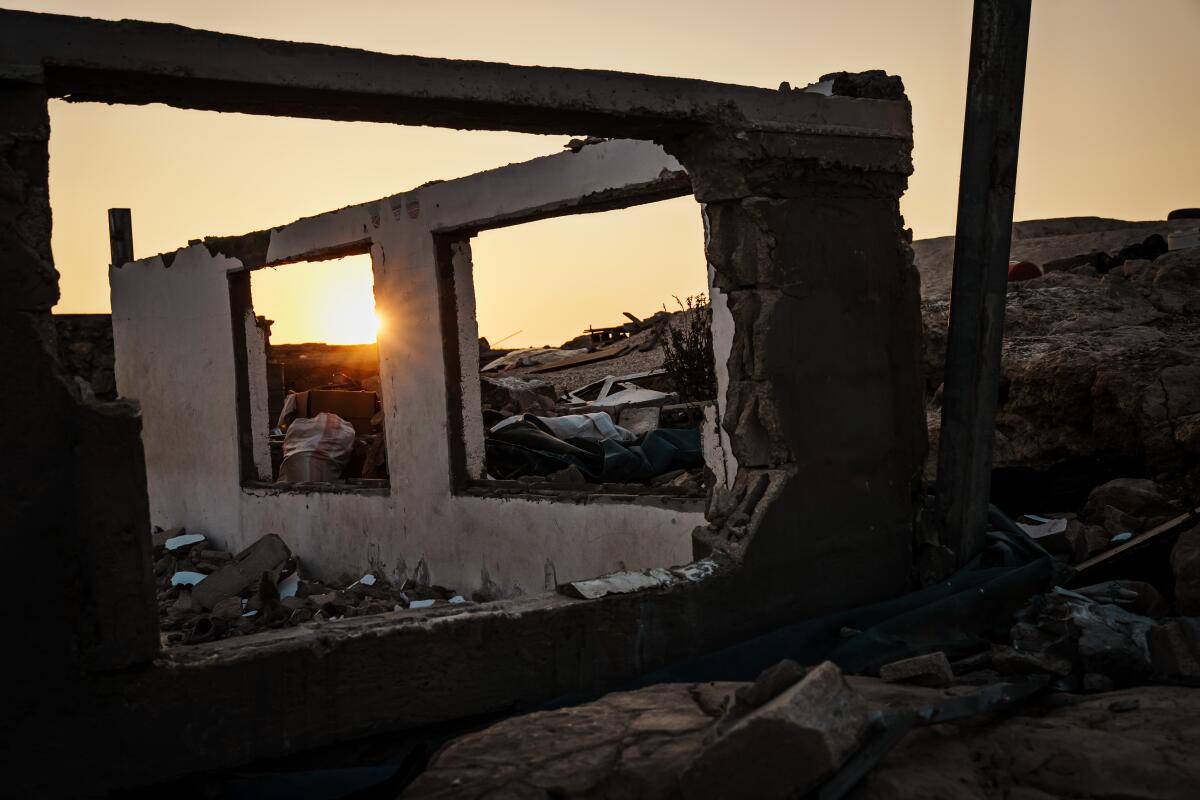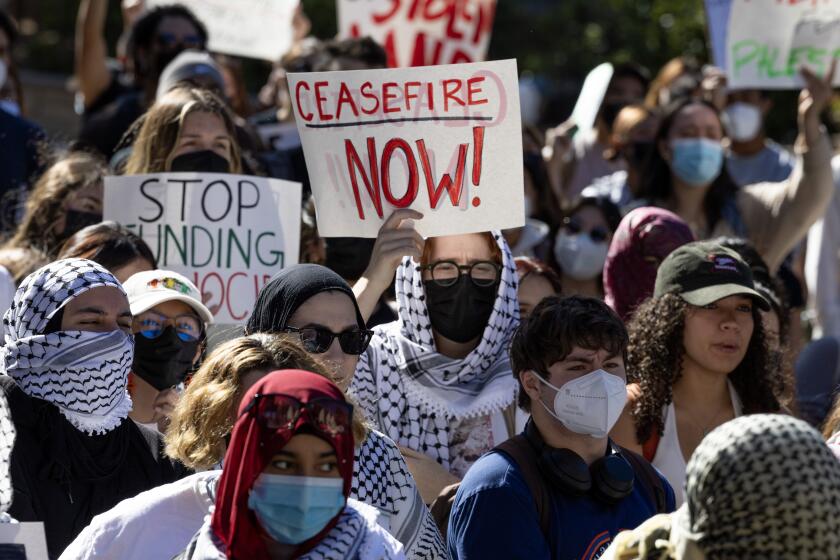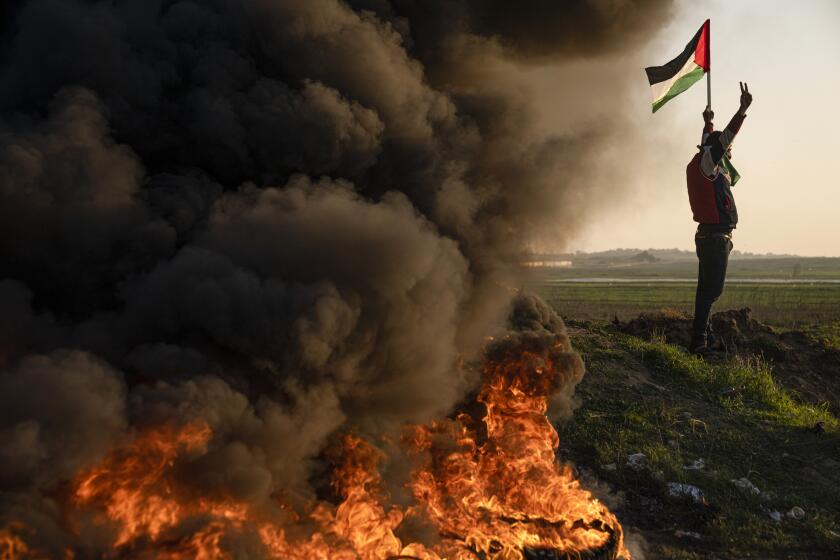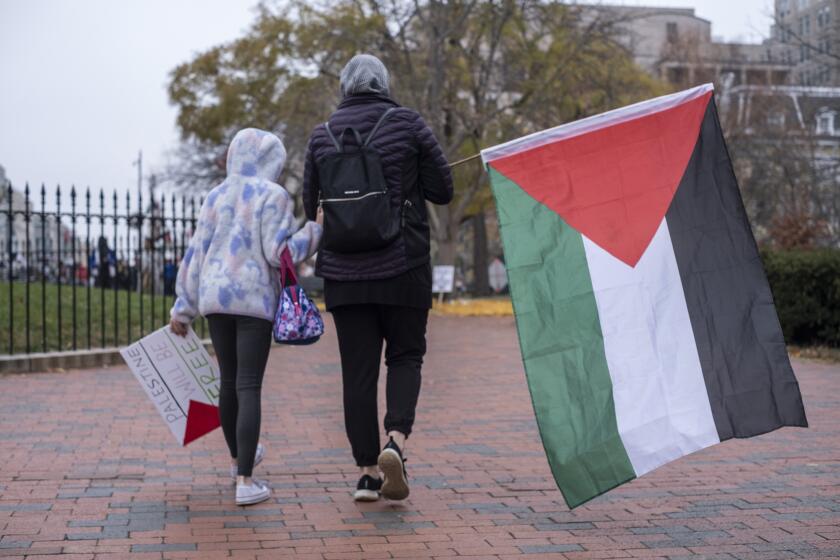Opinion: Palestine deserves to be free. Israel deserves to exist. How do we give peace better PR?

- Share via
Recently, in a downtown Los Angeles hipster coffee shop, I was waiting for the bathroom when I spotted a blackboard covered with phrases. One rendered in large mint-green cursive caught my eye: “Free Palestine,” it read, with a cartoon heart as punctuation. I picked up chalk, found an adjacent clearing and scrawled, “Two-state solution,” followed by the same adolescent heart-shape. It wasn’t that I disagreed with the original author’s statement; I just think peace needs better PR.
I didn’t grow up with the two-state solution. I come from a half-Jewish household, the Jewish half of which is Zionist. I was raised on which candidates would protect Israel, along with stories of how strangers welcomed my dad “home” at Ben Gurion Airport or how he packed chickens in a kibbutz.
I can be both broken-hearted over Israelis killed in the Hamas attacks and also grieve Palestinians killed in Israel’s retaliation.
In college, I studied Israeli contemporary dance, writing about giants in the field such as Ohad Naharin, and conducted archival research at the Suzanne Dellal Centre in Tel Aviv. In the Lisbon, Portugal, airport, on the way to Israel, I was detained for additional screening. An Israeli transportation officer didn’t believe that a 22-year-old man, traveling alone for four days to Israel, was going there to do dance research, whether he was Jewish or not. I brought research books out of my backpack to convince the officer. When I was finally let through and then landed in Israel, my luggage didn’t arrive. An Israeli friend’s parents generously lent me the underwear and clothes I needed until my bag came. In spite of the hiccup, I loved Israel. Tel Aviv was chic, vibrant and diverse.
Then, one year ago, my cousin on my mom’s side, which is Christian, married a Palestinian American. For their wedding, I traveled again to Israel, this time to the West Bank, to a Christian village called Taybeh. The ceremony was held outside on the ruins of a 4th century Palestinian Orthodox church. I spent four days with my cousin and her betrothed, eating hummus and za’atar crackers and emphasizing my 50% Italian American heritage from my mother to avoid suspicion. I learned how to shrug my shoulders and undulate my hands in the style of Palestinian social dance. I met hundreds of uncles and aunts and cousins. I toured the town’s breweries and distilleries: of wine, arak (an ouzo-like spirit) and their specialty, Palestinian beer.
The Oslo accords failed. As Gaza faces Israel’s bombardment, it’s time to radically reimagine how the two sides can negotiate.
On brewery and distillery tours, which mostly concerned the granular production process, guides also showed the cisterns on their roofs. The large vats collect rainwater, they explained, because it’s never clear when the Israeli-run water company will turn off their supply. The guides also described the tricky process of export: Israeli soldiers let cases of wine spoil for hours in hot sunlight, and few shipments reach their U.S. or European destinations.
During the wedding reception with more than 200 guests, the water was shut off. The bride, groom and guests were suddenly unable to wash their hands or flush the toilets. At my table, where big bottles of water were served alongside Coca-Cola, Taybeh beer, wine and arak, the groom’s cousin asked what I had studied in school. “Israeli dance,” I replied. The cousin furrowed his brow. “I didn’t know Israelis danced!” he exclaimed. “I thought they just shot people.” I turned to the dance floor, where, alongside fist-pumping men, the groom’s grandmother bounced on her knees, beaming, swinging her arms and mouthing Arabic lyrics. “Yes, Israelis also dance,” I replied.
As a Palestinian American who works in publishing, I see the power of stories to tear a people down or build them up.
In recent weeks, my social media feeds have become inundated with flags and slogans: condemning Hamas attacks, standing with Israel, showing carnage in Gaza, advocating for a free Palestine. In between are the requisite virtue signalers: My heart goes out to all, both Israeli and Palestinian, affected by this horrible tragedy. I promised myself I wouldn’t engage. The ethno-nationalist posturing or obsequious drivel, I felt, was counterproductive. Wouldn’t any involvement reducible to a slogan be unhelpful?
Looking at the hipster coffee shop message board, I realized that the problem isn’t so much that existing messaging is too simplistic. It’s that there isn’t a clear and exciting enough symbol for a middle way, a two-state solution. Palestine deserves to be free. Israel also doesn’t need to cease existing or protecting itself to make that happen.
As a rabbi, I teach the value of every human life. That’s why I and other rabbis in the Jewish peace movement are demanding an immediate cease-fire in Gaza.
Israel could give up a significant piece of its territory, its apartheid policies and any future settler expansion; Palestine could gain a corridor “from the river to the sea” and give up the right to a terrorist government that murders Jews. Both sides could teach their children about the other’s very real history of genocidal victimhood.
But compromise doesn’t have the resonance that “Free Palestine” or “I stand with Israel” has. It doesn’t hijack our limbic systems like the flags and phrases littering our homes, streets and feeds. Still, perhaps it could. Maybe, in an outrage-fueled system, peace and objective truth simply need sexier branding.
William Keiser is a Los Angeles-based screenwriter whose most recent pilot, “The Revolutionary Potential of Dance,” is about historical anticapitalist movements in America.
More to Read
A cure for the common opinion
Get thought-provoking perspectives with our weekly newsletter.
You may occasionally receive promotional content from the Los Angeles Times.














